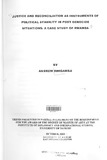| dc.description.abstract | The study sought to investigate the demands for justice could under gird reconciliation and examine what type of leadership, social processes, policy and institutional framework needed to be in place. Lessons were drawn from the Gacaca Judicial system, the National Reconciliation Commission and the International Criminal Tribunal for Rwanda (ICTR).
It emerged fro the study that justice is not only about the law and punishment, justice must repair, reconcile and eliminate the inequalities within the society. There is no uniform formula to the approaches of justice and reconciliation. Institutional frameworks
like the National Unity and Reconciliation Commission and the Community Gacaca Courts are very effective in facilitating the process of reconciliation. The challenge for Rwanda is how to employ justice and social reconstruction to respond to past abuses in a manner that allows communities with different experiences, needs and goals to
learn to live together again. | en |

